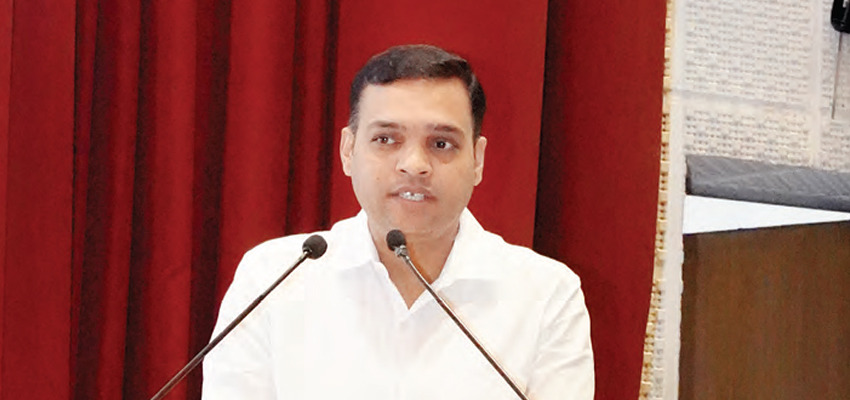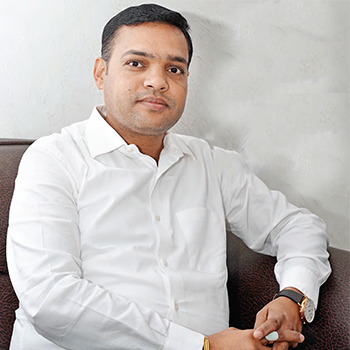Lessons from a Growth Investor

"The reality is, investors are able to reach only established startups, but majority of the bootstrapped startups or those who are stuck at an idea stage, don’t get to see the limelight. So, we are coming with a platform, wherein these startup entrepreneurs can showcase their innovative ideas to interested investors. And investors can see, select and invest
-Manoj Mishra, CEO, BIS Dhruv Ventures DOO
Experienced Foreign Exchange professional with a demonstrated history of working in the banking industry, Manoj Mishra, CEO, BIS Dhruv Ventures DOO, is skilled in Foreign Exchange Trading, Hedging and Options Strategies. After a stint of working with Credit Suisse, he started his entrepreneurial journey in a foreign land. From starting his company in Singapore, his success took him to open his business in Estonia, Serbia, and Seychelles. He talks to Corporate Citizen, on his career journey starting from India to his entrepreneurial journey across the globe, and about forex trading, hedging, crypto and financial markets
Corporate Citizen: Tell us about your education and career journey so far and how you chose to come into the finance field.
Manoj Mishra: Based out of Pimpri Chinchwad twin town city, I did my graduation from D.Y. Patil College, in Pune. After doing my MBA, in the year 2007, I joined Credit Suisse as Senior Analyst. After working for around six years at Credit Suisse, I started (*joined) at Astra India Financial Services, as an investment consultant and it lasted for seven years. In the year 2017, I jumped on to the entrepreneurship bandwagon and started my own financial business, Finanza Holding Pte Ltd, in Singapore. We are totally into finance—getting funds for the corporate and SME projects. Later I moved to Estonia and there I started a company called GlobeEX Foundation OU, followed by founding another company called BIS Dhruv Ventures DOO, in Serbia. In the year 2020, we also started Finanza Ltd, in Seychelles. So, these are the four major overseas companies I am operating right now. At present I am in process of incorporating a new company here in Pune, which will be a platform for startup funding.
CC: How did the opportunity to start your entrepreneurship venture overseas in Singapore, come to you?
When I was working with Credit Suisse, I used to interact with lots of bankers from abroad,and lots of the clients were also based out of Singapore, the USA and UK. If you go to South-East Asia, you don’t feel like you are out of India, so I was more comfortable working with them. One fine day, one of my friend said, “Why don’t you come down to Singapore and we will start a company. You have the domain knowledge and I have the technical knowledge, we can start a company here.” That is how I jumped on to the entrepreneurship bandwagon.
CC: Starting companies in four different geographies like Singapore, Estonia, Serbia, Seychelles, is a big challenge. How did you overcome the cultural and operational challenges in these countries?
The story is like, when we started Finanza Holding in Singapore, we started it as a IT company. When we started it, for one year it was really good, but afterwards we did face problems and incurred losses. Later on in the year 2018-2019, when Forex and Crypto market was booming, we dabbled into it. We planned to take Crypto license and started our company GlobeEX Foundation OU, in Estonia, and we started experimenting with Crypto. But again in 2020, we faced the Covid pandemic, and again for nearly two years we had to keep silent with business. Post Covid, for last one year we are again working with Crypto and Forex.
CC: Specifically, in India, the government is yet undecided with Crypto trading—I mean they are not making it legal and yet they are taxing it.
There is a myth in India that crypto is something illegal. In 2017 when I was discussing with few of the crypto investors in India, all of a sudden Mr Arun Jaitley, the then Minister of Finance of India, came with a statement that Bitcoin is illegal tender. One has to understand that you can keep crypto as a commodity—let’s say if you are investing Rs 1000 in mutual funds, you also invest 5 to100 rupees in crypto, definitely for long term.
The 30 per cent tax and 1 per cent TDS that is announced on income from transfer of cryptocurrencies, is ridiculous. If someone is making profit on it, you have to tax it, but not direct 30 per cent tax—you could have put it in one of the applicable tax slabs. Surprisingly at present, more than 30% investors in crypto are Indians.
"You should have patience, in case your investment is going down. If it’s going down, don’t panic, don’t sell. If its going up, just relax, till you reach the targeted gains. Patience is the only skill required for forex

CC: Do you foresee a direct impact of this global banking turmoil, triggered by the collapse of Silicon Valley Bank, on the Indian banks?
The Indian banking system is one of the strongest system across the globe. When the banking systems in the USA and UK are shaking, in my opinion, firstly, nothing will impact the Indian banks. Secondly, why the US and European banks are amid turbulence? The major reason I personally see is because they are into financial instrument trading. If you take SVB or any banks there, they will keep a collateral of say $100 million, but they will give a loan of $120 million—the interest rate is 2 per cent. But here in India, if you mortgage your house of say rupees one crore, the bank will give you sixty lakhs—so they already have the asset with them. The US and UK banks are into inter-bank trading, they keep on lending numbers to other banks, but at the end-of-the- day if something goes wrong with one bank, as they are interlinked, all of them will have a direct impact from the turbulence.
CC: Forex trading is said to be risky but highly rewarding.
It is highly risky if you are going for intraday trading and highly rewarding if you could procure it for long term. So, wherever you are investing, put it for a long term, then definitely it is highly rewarding. I don’t know why forex trading India is made illegal—though it is illegal in India, people are still investing through other platforms. But I think, it is because of the volatility of the currencies. When I started investing in Forex, I majorly invested in USD— it was Rs 65 when I invested in USD, now it is Rs 80. So, the kind of return you will get over a period of time—if you are keeping for 3–4 years and not going for intraday trading, the returns are fabulous.
CC: The currency fluctuations are very high due to a natural outcome of floating exchange rates. Are there any indexes available for knowing the exchange rate fluctuations and how can one decode the forex market trends?
We are getting live rates from our brokers. We also stay up to date with the live forex rates we get from leading forex trading companies. So, we use these exchange rates and trends to make informed trading decisions. Every year the market sees some kind of fluctuation, if your risk appetite is high then you can go for higher forex.
CC: What are the advantages of forex trading for one’s investment journey?
The big advantage is that you will definitely get high returns, but not if you go for short term, you should go for long term investment, that’s my advice. At least keep for two-and-half years and don’t sell and don’t buy in between. Don’t even put cap—even when its seems lucrative don’t buy and even if there is fall in your investment, don’t buy. The moment you feel yes my target price has reached—say when you invested the Euro was 70 rupees and now it is 80 rupees, I got more than 3% of returns, then only you go ahead and sell. Set your target returns and when that target is achieved, then only you go ahead and sell.
Talking about challenges—it is 24x7 market. I personally see no challenges, because once you have invested, you stay invested and just relax. If we talk about crypto, it is more volatile market than forex.
CC: Are e-wallets providing seamless transfers between different currencies?
For example, e-wallet like Paypal, is operating an online payments system in the majority of countries, but it is not providing services in India and in Indian rupees. E-wallet is only for just keeping currency’s value within the country, whenever needed it can be verified,while withdrawing Indian rupees.
CC: Between online banking services like e-wallets and internet banking, which one do you say is safer to use and should be on your smartphone?
Online or net banking is different from e-wallets. For example, Google Pay does not need RBI authorization, because it is only a platform transferring money from your bank accounts to the merchant’s accounts. They are not keeping funds like Paytm wallets. I would say that e-wallets are less secured option than internet banking, which is highly safe.
CC: Are there any restrictions on foreign currency ownership or conversions into different currencies?
If you are an Indian citizen, holding an Indian passport, then there are restrictions. You cannot hold more than the specified amount of foreign currency. It is legal to keep the leftover foreign currency but there are certain rules and regulations against holding a foreign currency for long. I think, an Indian resident can hold leftover foreign currency of not above USD 5000 in notes and coins, for some specific time limit.
"Gold and real estate are the best options to hedge your risks. They give you good returns, provided you stay invested in them for long term. If you are going for stocks, mutual funds, forex, or crypto, you can minimize your risks, but again it is volatile and nothing is guaranteed

CC: Those who are aspiring to come into the Forex trading industry, are there big opportunities, especially in India?
India is already a big market for forex trading. The Indian investors are moving towards forex nowadays. But someone who wants to build their own platform in forex trading here in India, it is very tough, because our MCAs are not allowing forex, our payment gateways are not allowing forex—at the moment there are limitation of forex trading in India. Forex trading is legal in India, but the scope is limited due to strict regulatory restrictions.
As far as forex trading is considered, I see India only as a market and nothing else. Definitely, I would like to see India opening up for forex trading market. Because, ultimately some one is sitting overseas, are enjoying our money. If you are opening India for forex market, that money will definitely come to India.
CC: India is the fifth largest economy in the world and it has become a big role player on the global platform, but as far as rupee as a currency is concerned what is its strength in the global market?
The Indian Rupee is now going global, as 18 countries have agreed to trade in Rupee. Rupee in international market is surely strengthening, because you can see that now RuPay card is working in Russia. Our central bank, RBI, has now allowed countries like Germany, Kenya, Sri Lanka, Singapore, UK and Cambodia as well to transact in Rupee. This will definitely boost trade with these countries. As the world is trying to de-Dollarize the international market, India should turn this into an opportunity.
CC: The whole world is going through a volatile market condition, as we went through the Covid pandemic recently and now we are facing the Russia-Ukraine war. How does one manage risks in the midst of this volatile condition? Besides gold, are there any good options to hedge your risks in India?
What I found out is that gold and real estate are the best options to hedge your risks. They give you good returns, provided you stay invested in them for long term. If you are going for stocks, mutual funds, forex, or crypto, you can minimize your risks, but again it is volatile and nothing is guaranteed. If you want to play safe, go for commodity, gold and real estate. Systematic Investment Plan (SIP) is an investment route offered by Mutual Funds,which is also good to create long term wealth. I would suggest, go for equity if you are young and put it for long-term, not less than 15-20 years.
CC: Indian foreign exchange currency hedging market is limited to a few currencies like the US Dollar and Euro.
USD and Euro are the only tradable currencies across the globe and till now that has been the trend. Why? Because they represent two of the biggest economies in the world. But, people are fed up now with the domination of these two currencies. Which is why they are seeing Indian rupee strengthening—other countries are now allowing Rupay Cards, accepting BHIM UPI—we are already in process of strengthening our rupee.
CC: Does one need specific skills to enter into forex trading
You should be a good trader and have thorough currency knowledge. The main skill is that you should have patience, in case your investment is going down. If it’s going down, don’t panic, don’t sell. If its going up, just relax, till you reach the targeted gains. Patience is the only skill required for forex.
CC: What is the role you are playing in the Smart City project in India and how are you involved in it?
I started my operations last year in Pune city, for a platform called “eNummos”. For this platform, my technical team sits in Gurgaon. Through this platform we are getting entrepreneurs and the investors together—it is a business platform, where you can raise funds for startups and SMEs. If it’s a government related project and you are lacking funds, you can register the project on this platform and if your project is viable for fund, we will arrange the funds you require.
We are not looking at investing in only established businesses, but bootstrapped companies, seed funded businesses, Series A, B, and C venture capital investments. What I have studied is that 50% of the startups in India are dying, or selling their company or idea to someone, only because of lack of funds. The world is looking towards India as an investment market. The reality is, investors are able to reach only established startups, but majority of the bootstrapped startups or those who are stuck at an idea stage, don’t get to see the limelight. So, we are coming with a platform, wherein these startup entrepreneurs can showcase their innovative ideas to interested investors. And investors can see, select and invest.